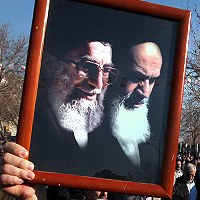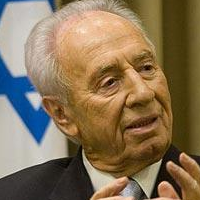![]()
Fri, Aug 19, 2011 | Rubin Reports | By Barry Rubin
Terrorists Attack Egyptian Army, More Details on Eilat Terror Attack
A gunfight is going on in the early afternoon of Friday between terrorists, probably from the Gaza-based Popular Resistance Committees, an al-Qaida affiliate, and the Egyptian army. The battle is taking place on the Egyptian side of the border near where terrorists killed 8 Israelis on Thursday.
At least two suicide bombers have targeted Egyptian soldiers in the area. No casualty figures are available. It is estimated that between seven to ten terrorists are involved. On Thursday, Israeli forces believe that they killed seven terrorists, though two of the bodies are on the Egyptian side of the border.
Official Israeli estimates now say 27 Israelis were wounded in the terror attack. The terrorists deployed four improvised explosive devices designed to kill civilians on Israeli territory. Two were captured intact by Israeli forces. So far, they are believed to be similar to those used in previous Palestinian attacks.
Israeli forces attacked Popular Resistance Committee targets in the Gaza Strip. Among the dead was one of the group’s leaders.
This group killed three U.S. government employees almost five years ago to the day. The men were security guards for State Department officials distributing scholarships to Palestinians in the Gaza Strip. The U.S. government at the time demanded that the Palestinian Authority, which then ruled the Gaza Strip, arrest and imprison those responsible. But while the Palestinian Authority promised to do so, no action was ever taken and the men remained free. The U.S. government has taken no action regarding this terrorist attack or the PA”s refusal to help.
Complex conspiracy theories aren’t needed to explain the attack from Gaza through Egypt against Israel and its timing. Here’s an explanation involving two non-contradictory factors:
Option 1: This should be seen as the Popular Resistance Committees (PRC) trying to make its own mark as being successful in killing Israelis, the basic standard by which Palestinian groups are judged by the public. Al-Qaida and its affiliates have been trying to hit Israel for a long time and never succeeded. They simply took advantage of the opportunities in Sinai and with Egypt to pull this off. They’ve been also building up their forces in the past couple of years. Either Hamas didn’t know about it or did and didn’t interfere because…
Option 2: Hamas wants to hit Israel and is looking for new ways to do it. Hamas doesn’t care about embarassing Egypt’s government and the PRC factor gave them plausible deniability, just as Hamas uses various smaller groups to launch rockets or attack Israel from the Gaza Strip and then disclaims responsibility. It wants to develop this kind of operation for themselves in future and know they can depend on the Muslim Brotherhood for help so this is a rehearsal for them. Also in the longer run Hamas is thinking of provocations that might drag Egypt into war with Israel.
Also keep in mind that there are two different sets of terrorists: Palestinian groups in the Gaza Strip attacking Israel; Egyptian groups in northern Sinai attacking the Egyptian government. Two battalions of Egyptian troops had earlier been sent into Sinai to deal with the latter threat.
We should be aware of two historical precedents:
— In the early 1950s, and especially in 1954-1955, Egyptian intelligence coordinated cross-border fedayeen operations against Israel, often using old Muslim Brotherhood networks in Gaza. In 1955, Israel did a retaliation operation which accidentally ended up by killing Egyptian soldiers whose trucks drove into an Israeli ambush. Egypt turned to the USSR for arms and this led to the Sinai campaign of 1956. After that, the Egyptians generally tried to prevent cross-border attacks by Palestinians in order to control the situation and avoid war with Israel.
— From late 1967 to about 1970 or 1972, PLO strategy was to use cross-border attacks, mainly from Jordan and Lebanon to try to trigger tensions that would lead to a new Arab-Israeli war in which they hoped the Arab states would destroy Israel. This ended,in large part because Jordan didn’t want to be dragged into war or taken over by the PLO and so crushed the Palestinians in September 1970. When war did come along in 1973, the PLO didn’t benefit, wasn’t invited to participate, and of course hated Egyptian President Anwar al-Sadat’s effort to use the war as a basis to make peace with Israel.
The absolutely key issue for the next couple of years is whether Egypt’s government or public develops a war hysteria to fight Israel. Observers living far away can dismiss this by asserting that these factors will act “rationally” and conclude in advance they would lose such a war and suffer heavy casualties. However, Islamist and nationalist enthusiasm does not always behave like an accountant or a Washington-based policy analyst.
Egypt’s rulers — and they will be different ruler in a few months — face classical Arab problems:
— Don’t want a losing war? So will you shoot to kill terrorists trying to cross the border (the way you do African refugees)? But then you will be accused of being Israel’s policeman and reviled by the public as traitors.
— Want to avoid foreign adventures and focus on making life better at home? But you can’t do that. You don’t have the money and you are either a radical seeking to gain power by demagoguery or someone in power who doesn’t want to give your opponents ammunition by being too moderate. When people start rioting over lack of homes, jobs, or bread, the best thing to do is to stir them up against America, the West, and Israel.
In Arab politics you can be better off by yelling slogans to prove you are militant than you are to get hundreds of millions of dollars in U.S. aid. Don’t believe me? Ever hear of the shah of Iran? Or such assassinated politicians as King Abdallah of Jordan or Anwar al-Sadat of Egypt? Gamal Abdel Nasser led Egypt to losing wars and disasters. He’s a hero. Sadat led Egypt to peace, regaining territory, and some economic improvements. He’s despised.



 RSS
RSS











Terrorists Attack Egyptian Army, More Details on #Eilat Terror Attack | #Egypt #Israel #terrorism http://t.co/TbH8PEt
Terrorists Attack Egyptian Army, More Details on #Eilat Terror Attack | #Egypt #Israel #terrorism http://t.co/TbH8PEt